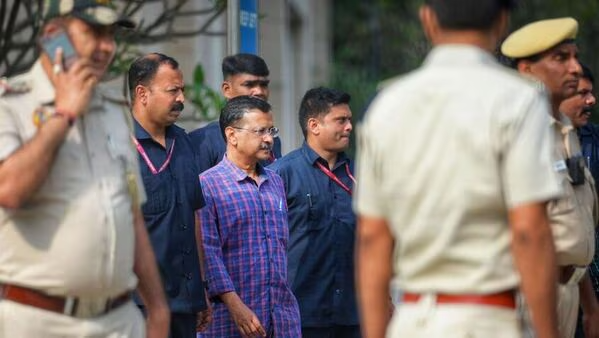Just ahead of the Supreme Court hearing on the bail plea of Delhi Chief Minister Arvind Kejriwal in money laundering case linked to the alleged excise policy scam, a Delhi court on June 25 granted the Central Bureau of Investigation (CBI) a 3-day custody of Kejriwal.
The CBI, earlier in the day, formally arrested Kejriwal and sought a five-day custody of the AAP national convener in the corruption case. Special Judge Amitabh Rawat in the Rouse Avenue Court allowed the CBI to formally arrest Kejriwal and gave it 3-day custody of the CM.
While the Enforcement Directorate (ED) case investigates the alleged money trail, the CBI case will have to prove corruption and bribe-taking by public servants.
The ED first arrested Kejriwal in March this year on money laundering charges. This was the only charge against Kejriwal — the generation of alleged tainted funds and its use. Section 3 of the Prevention of Money Laundering Act (PMLA), which criminalises money laundering, lists concealment, possession, acquisition, use, projecting as untainted property, or claiming as untainted property as crimes.
The CBI had registered a case of corruption under the Prevention of Corruption Act (PC Act) back in 2022, but it did not name Kejriwal as an accused. In fact, this March, when the ED took Kejriwal into custody, Additional Solicitor General SV Raju had told the Delhi court that “one need not be an accused in the predicate offence to be an accused under PMLA.”
Essentially, the ED’s argument was that money laundering was a standalone offence that did not depend on the existence of a predicate offence.
In April, the CBI called Kejriwal for questioning, but his lawyers have argued in court that it was as a witness and not as an accused.
Kejriwal has so far not been named as an accused in the corruption case.
While the CBI always had the option of arresting Kejriwal, it would first need to gather some plausible evidence linking Kejriwal directly to the alleged scam.
This direct link is suspect in the ED’s case as well. The ED has made a case alleging vicarious liability, both Chief Minister of Delhi and as convenor of the Aam Admi Party, to link Kejriwal to the alleged tainted funds.
However, this cannot be an option in the corruption case.
Additionally, since the bar for granting bail under the PMLA is high, leading the prosecution effort with the ED case allows for prolonged custody of the accused.
An accused can move for anticipatory bail in a corruption case. The grant of bail in non-bailable offences is subject to judicial discretion.
Unlike the PMLA, which is an alternative criminal law framework to deal with the offence of money laundering, the PC Act itself does not impose stringent qualifications for bail.
Under the PC Act, an accused moves court for regular bail under the Code of Criminal Procedure. However, as per an amendment introduced in 2014, no accused shall be released on bail under the PC Act unless an opportunity is provided to the public prosecutor to oppose the bail application.
In 2019, while granting bail to former Union Minister P Chidambaram in the INX media case, the Supreme had Court underlined the factors that were to be taken into consideration for deciding an application for bail under the PC Act.
It said: “The nature of accusation and the severity of the punishment in the case of conviction and the nature of the materials relied upon by the prosecution; reasonable apprehension of tampering with the witnesses or apprehension of threat to the complainant or the witnesses; reasonable possibility of securing the presence of the accused at the time of trial or the likelihood of his abscondence; character behaviour and standing of the accused and the circumstances which are peculiar to the accused; larger interest of the public or the State and similar other considerations” must be taken into account.
Also Read: Arundhati Roy Wins Pen Pinter Prize Amid Legal Battles












